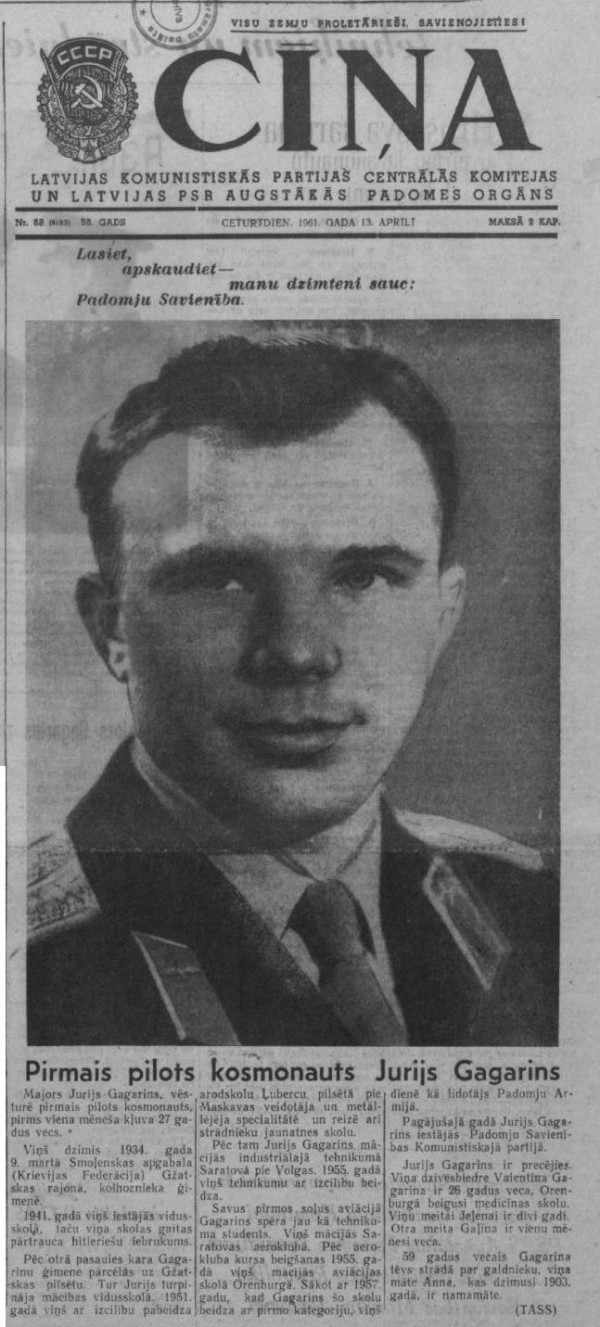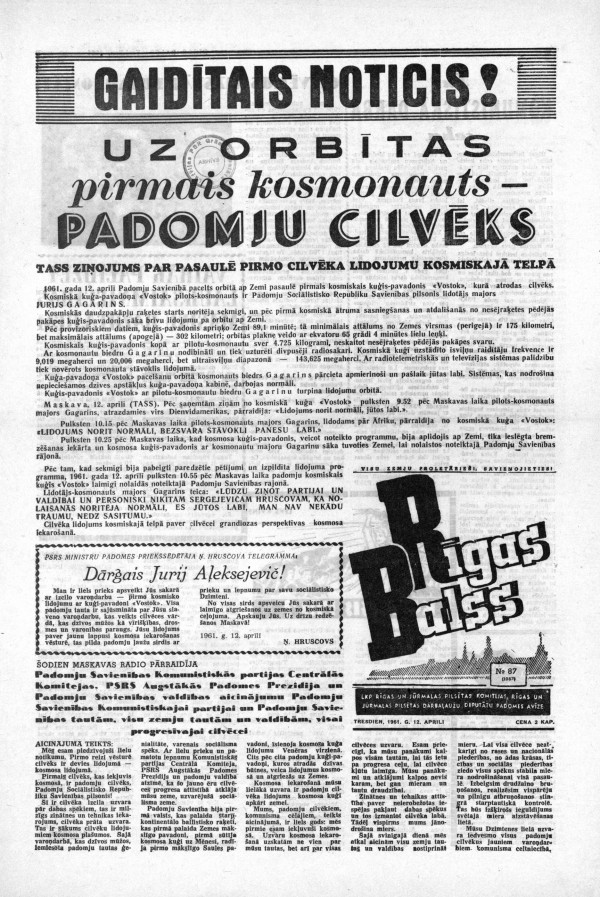Lightning and Gagarin from a clear sky

April 12 of this year marks 60 years since the highest achievement of the Soviet Union (USSR) in the literal sense of the word - Yuri Gagarin left the Earth's atmosphere and gravitational field.

In 2011, on the 50th anniversary of the flight, Russia declassified and published data that reveal the numerical parameters of the flight. They describe the orbit of the flight - an ellipse of 327×180 kilometers around the Earth. These figures are also among the arguments why Yuri Gagarin (1934-1968) had definitely earned all his awards for a 106-minute flight. It turns out that at the highest point of his orbit, or farthest from the Earth, he was about 100 kilometers further than expected. From this height, the astronaut would no longer have been able to get back, that is, come back alive if there had been a failure in his spacecraft's braking system. The simplification of this system by getting rid of spare or backup elements was one of the conditions for launching the spacecraft on April 12, 1961, at least a few days before something similar was being prepared by the Americans, according to rumors and intelligence reports. They had to be beaten at all costs, including the additional risks to the astronaut's life.
Every moment was a critical moment
Due to the space race, the Soviet spacecraft Vostok-1 did not have the equipment to rescue the astronaut if an emergency happened during the rocket launch or to soften the landing of his landing capsule. The braking system had been simplified by referring to a planned orbit from which the spacecraft would arrive in ten days without braking, but only at the expense of its natural deceleration. That is how long a man should be able to endure in the spacecraft in which Y. Gagarin was sent to heaven. However, a failure occurred in the spacecraft's launcher, which did not disconnect the launch vehicle in time. It carried the ship much higher than planned. From its real orbit, the spacecraft would reach the earth in a month, and the astronaut would not be able to survive that long. The braking device, on the other hand, basically performed its task, although it did not disconnect Y. Gagarin's landing capsule in time from those parts of the ship without which landing would be safer. But that's okay, they burned and fell off themselves after the spacecraft entered the dense layers of the Earth's atmosphere. Because of these discrepancies, Y. Gagarin landed more than 400 km from where he was supposed to end up. It so happened that he was going to fall not on the ground, but in the water - the Volga river. As already mentioned, his landing capsule was not equipped with devices to reduce its impact on the ground or to swim in the water, where the Americans later landed their astronauts. The capsule had fulfilled its main task by isolating the astronaut from the three to four thousand degrees high temperature with which the outer parts of the spacecraft burned. Y. Gagarin catapulted from the capsule and parachuted seven kilometers above the ground, using the skills of a war pilot to steer not only a plane but also the trajectory of the parachute away from where he fell. He had to do without air for a while, when there was no more air from the landing capsule, but there was yet no air from Earth, because the valve in his spacesuit had not opened, which, depending on the circumstances, had to pressurize or seal his suit.
Certainly, not all the options that could have led to Y. Gagarin's death are described here. Such chances have hardly been eliminated to this very day. Both Soviet and American astronauts continued to die decades after Gagarin's flight, despite the fact that space flight sometimes seemed a well-learned, almost commonplace occupation. However, recalling at least some of the risks of the first spaceflight is enough to make it clear why the USSR announced Gagarin's flight no earlier than when there was a clear favorable outcome, at least for the start of the flight. If this result was bad, then it would have been just some flight tester who died in some tests, as these things happened and continue to happen even outside space travel. The country confirmed that its spacecraft was in orbit when the Americans would have noticed it anyway. Y. Gagarin shook the whole world like lightning from a clear sky. After that, broadcasts of spacecraft launches added among the very few live broadcasts of the USSR Central Television in the 1960s and 1970s.
Rīgas balss says it all at once

Y.Gagarin's flight started and ended at a time that allowed this flight to be documented in Latvian on April 12, Wednesday of that year, by the newspaper Rīgas Balss that was prepared in the afternoon and released in the evening of the relevant day. It managed to not just write one article, but the entire 1st page was placed under the heading "The expected has happened!" with a subtitle explaining that "The first astronaut in orbit - a Soviet man" and further with an indication that the "TASS statement on the world's first human flight in space" is printed. In fact, several statements of the USSR news agency TASS were printed in the order of the flight from the moment when "the launch of space multilevel missile was successful" to the moment after the flight, when it became safe to quote the following words of Y. Gagarin, which were written only in capital letters: "PLEASE REPORT TO THE PARTY AND THE GOVERNMENT AND PERSONALLY TO NIKITA SERGEYEVICH KHRUSHCHEV THAT THE LANDING WAS NORMAL, I FEEL GOOD, I HAVE NO INJURIES, NOR BRUISES.” Followed by the Prime Minister of the USSR, N. Khrushchev's (1894-1971; not only the leader of government but also the leader of the Communist Party of the USSR until 1964) reply telegram to Y. Gagarin "Dear Yuri Alexeyevich!..." and the call of the Central Committee of the Communist Party of the Soviet Union and other state administrations to "all progressive humanity.” It first reminded us that the USSR was "the first country to launch an intercontinental ballistic missile, the first to launch an Earth's artificial satellite, the first to send a spacecraft to the Moon, the first to create an artificial solar satellite, the first to send a spacecraft in the direction of Venus." From this, they concluded that "the development of science and technology opens up unlimited possibilities for the subjugation of the forces of nature" if it were not hampered by wars or at least an arms race. Therefore, "let's end the feverish armaments, realize universal and complete disarmament under strict international control."
The next day, April 13, all newspapers published in Latvia and in the USSR in general had become special editions dedicated to Y. Gagarin's flight, in which only news and comments about and around Y. Gagarin's flight were published. It is likely that meetings had taken place or were scheduled to take place in all workplaces, the descriptions of which were one of the topics in the newspapers. Officials, the media, and the masses of people recounted in immensely varied ways the USSR's greatness that is used in the struggle for peace, which the world recognizes just as much as the Soviet and socialist victory in the space race. It was supplemented by pandering to N. Khrushchev, who had in mind the idea of ending Christianity and religious cults in the USSR. Y. Gagarin's flight seemed the best way to do so with proof that there was no God, because Y. Gagarin himself had been up there in heaven and had not met God there. In this manner, the media continued for at least a week, covering Y. Gagarin's welcome in Moscow, the award ceremony and the meeting with N. Khrushchev when they exchanged many pleasantries in person.
Corn cannot grow in space
The glorification of space flight was not achieved by force. From today's point of view, the 1961 space flight was the biggest in the entire history of the USSR in terms of the amount of voluntary participation of people in its celebration. No matter how unquestionably and indescribably the enthusiasm had previously been caused by the establishment of the Soviet Union and also by the victory in World War II, it was clear to many and immediately that these events brought them horror and death. No one had gotten worse because of the space flight, even if people still managed to ruin each other's life. Believers received another dose of ridicule externally, and probably internally too, at least to those who thought of their object of faith as a mighty man capable of sitting on the edge of a cloud and sending lightning and sickness to the ungodly. Not all flight staff subsequently agreed that the orders were divided and the posts redistributed by their actual merits. However, such reservations do not distort the general view that space flight was a real achievement of the Soviet state, in which every person living in the Soviet Union could also see their contribution with work in science and education, industry, public administration, etc.
This time, the residents of the Latvian SSR, fervently praised the flight because the opportunity to do something like that with a clear conscience was not a daily occurrence. As a symbol of the Soviet daily life directly from N. Khrushchev's reign, it remained the duty to venerate the cultivation of corn. Namely, the cultivation of corn, if not literally in permafrost, then really close to it, i.e. in no way in line with the growth potential of the species and its varieties or the agricultural needs of the areas concerned. It was so stupid that N. Khrushchev was ousted by other Soviet regime officials who properly assessed N. Khrushchev's campaigning if not as a threat, then as a great inconvenience to the existence of the regime. Now everyone can wisely say that N. Khrushchev's huge nonsense was replaced by the murmuring nonsense of Leonid Brezhnev (1906-1982). Such an everyday life turned out to be more important than some successes, including feats, among which is the flight of Y. Gagarin. It is now just as long since the collapse of the Soviet Union as the time that it could sustain itself after Gagarin's flight.
*****
Be the first to read interesting news from Latvia and the world by joining our Telegram and Signal channels.